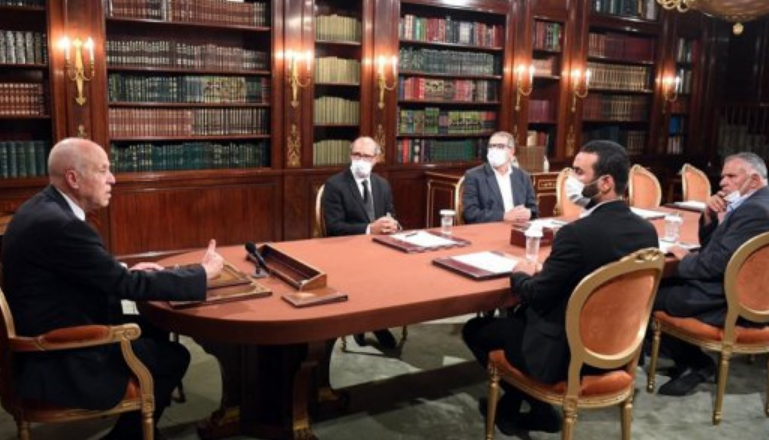Coup d’état, not coup d’état? How best to describe Tunisia’s latest events is the subject of bitter debate. Two days after it was announced that its Parliament’s activities would be suspended and its head of government dismissed, Tunisia’s President Kaïs Saïed’s supporters proposed a simple solution to remedy the country’s socio-political climate.
Presidentialist project
For his part, Carthage’s tenant felt that “he had launched several alerts” and that “his duty commanded him to act”, after not having been heard. This approach was in line with what Saïed had stated that he wanted to achieve since his inauguration: end corruption and clean up the political landscape.
‘We’ll see’ has probably been the most used phrase in the country within the last 48 hours.
But his grip on power also allows him to advance his presidential project and his idea of participatory democracy, which (according to him) is supposed to better reflect the will of the people.
Since the evening of 25 July, the constitutionalist has been leading the country alone and interprets the popular jubilation as support. But he has not announced a plan of action that would allow the public to understand his objective and method for achieving it.
“We’ll see” has probably been the most used phrase in the country within the last 48 hours. Tunisians are no doubt expecting dramatic events to take place, such as placing politicians under house arrest, freezing assets or even arresting those whom the President considers corrupt. They also expect that a new government will take over to replace that of Hichem Mechichi.
For the moment, nothing of the sort is happening apart from the curfew that been extended from 7pm to 8pm until 27 August; a measure justified as an attempt to control the ongoing pandemic, but mainly perceived as an attack on freedoms. Especially since it has led to increased border control, the closure of the Al Jazeera office in Tunis and the confiscation of the online newspaper Tunisie Numérique’s photographic equipment.
Chancelleries’ lukewarm response
“We could call it a turn of the screw,” says one journalist, who was surprised that in such a tense situation, the head of state had decided to get rid of defence minister Brahim Bartagi (whom he himself had appointed) and not assign this position to someone else.
But it seems that Saïed, after the shock announcements, is trying to reassure the country. Efforts to do so began by him receiving the national organisations and speaking at length with Noureddine Taboubi, the secretary-general of the Tunisian General Labour Union (UGTT), and Samir Majoul, the secretary-general of the Tunisian Confederation of Industry, Trade and Handicrafts (Utica), on 26 July. After these meetings, the Tunisian President revealed his roadmap and was informed that a national dialogue would be held in 30 days, as provided for by Article 80.
The central government says the rights guaranteed by the constitution will be upheld and respect of people’s rights and freedoms remain important. This position is held by other governments, which have lukewarmly welcomed Saïed’s initiative.
Although they affirmed their support for Tunisia, they have also expressed concern and believe that it must readopt its constitution as soon as possible. Only a few strongly condemned suspending the assembly’s activities and excluding the people’s elected representatives.
Mustafa Sentop, president of the Turkish parliament, has used words which angered people and said that “activating Article 80 constitutes in itself a blow against constitutional order.” Arab countries, for their part, have avoided commenting. Algeria’s President Abdelmadjid Tebboune had a long meeting on 26 July with the Tunisian head of state and sent Ramtane Lamamra, his foreign affairs minister, to Tunis.
Both the Russians and Americans agree that they want a democratic solution. But the Ennahdha Movement can still count on some back and forth from the US capital. Notably from Republican Joe Wilson, who wrote an article for the Washington Post asking that US President Joe Biden “try to stop the coup in Tunisia.” Washington, which is “analysing the situation”, has urged the Tunisian President to maintain dialogue with all political actors.
German “concern”
Even the International Monetary Fund has spoken out and said that it is willing to continue to help Tunisia “counter the Covid-19 crisis”, achieve a recovery “rich in job creation” and restore public finances.
European voices are of the same mind. France issued a press release in which it expressed hope that “institutions would return to normal as soon as possible” and called for “all the country’s political forces to avoid any form of violence and to preserve the country’s democratic achievements.”
Germany has been a little more anxious and expressed “concern” about the latest events. The same is true for Italy, which fears illegal immigration will increase during this unstable period.
Josep Borrell, the European Union’s high representative for foreign affairs, called for “the restoration of institutional stability as soon as possible, and in particular the resumption of parliamentary activity, respect for fundamental rights and abstention from all forms of violence.” The international scene is united in calling on Carthage’s tenant to get the country back on track.
